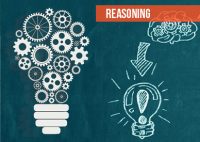Mathematical Operation For SBI PO Set – 7

Mathematical Operation For SBI PO Set – 7
1) Statement:
A > B, B ≥ C = D < E
Conclusions:
I. C <A
II. D ≤ B
a) If only Conclusion I follows
b) If only Conclusion II follows
c) If either Conclusion I or II follows
d) If neither Conclusion I nor II follows
e) If both conclusions I and II follow.
2) Statement:
H > J = K, K ≥ L, L > T, T < V
Conclusions:
I. K > T
II. L ≤ H
a) If only Conclusion I follows
b) If only Conclusion II follows
c) If either Conclusion I or II follows
d) If neither Conclusion I nor II follows
e) If both conclusions I and II follow.
3) If ‘+’ means ‘ –’ , ‘ – ’ means ‘×’ , ‘×’ means ‘÷’ and ‘÷’ means ‘+’, then, what is the value of ? 9 – 7 +85× 17 ÷15?
a) 73
b) 83
c) 79
d) 68
e) None of these
4) If ‘R’ denotes ‘÷’, ‘P’ denotes ‘×’; ‘W’ denotes ‘+’ and ‘V’ denotes ‘- ’; then 14 W 16 R 4 V 3 P 5 =?
a) 15
b) 4
c) 6
d) 3
e) None of these
5) In the questions given below, certain symbols are used with the following meaning.
If ‘+’ is written as ‘-’ ‘-’as ‘×’, ‘×’ as ‘÷’ and ‘÷’ as ‘+’, then what will be the value of the following equation? 7 – 30÷ 5× 1 + 9 =?
a) 205
b) 206
c) 216
d) 256
e) None of these
6) In the questions given below, certain symbols are used with the following meaning.
If ‘K’ denotes ‘×’, ‘B’ denotes ‘÷’, ‘T’ denotes ‘-’and ‘M’ denotes ‘+’, then
40 B 8 T 6 M 3 K 4 =?
a) 19
b) 11
c) -31
d) 23
e) None of these
7) If ‘P’ denotes ‘÷’, ‘Q’ denotes ‘ –’. ‘R’ denotes ‘×’ and ‘T’ denotes ‘+’, then 24 T 16 Q 32 P 8 R 4 = ?
a) 4
b) 39
c) ¼
d) 40
e) None of these
8) If ‘×’ means ‘subtracted from’, ‘ – ’ means ‘added to’, ‘÷’ means ‘multiplied by’ and ‘+’ means ‘divided by’, then 8-12 +4 ×3÷3 =?
a) 35
b) 12
c) 2
d) 4
e) None of these
9. In the questions given below, certain symbols are used with the following meaning.
A @ B means A is greater than B.
A * B means A is either greater than or equal to B.
A # B means A is equal to B.
A $ B means A is either smaller than or equal to B
A + B means A is smaller than B
Statements:
T * U; U $ W; V @ L: W + V
Conclusions:
I. U + V
II. L # W
a) if only conclusion I is true
b) if only conclusion II is true
c) if either conclusion I or II is true
d) if neither conclusion I nor II is true.
e) if both conclusions I and II are true.
10) In the questions given below, certain symbols are used with the following meaning.
A @ B means A is greater than B.
A * B means A is either greater than or equal to B.
A # B means A is equal to B.
A $ B means A is either smaller than or equal to B
A + B means A is smaller than B
Statements:
P $ Q; N # M; M @ R; R * P
Conclusion:
I. P + N
II. Q $ M
a) if only conclusion I is true
b) if only conclusion II is true
c) if either conclusion I or II is true
d) if neither conclusion I nor II is true.
e) if both conclusions I and II are true.

